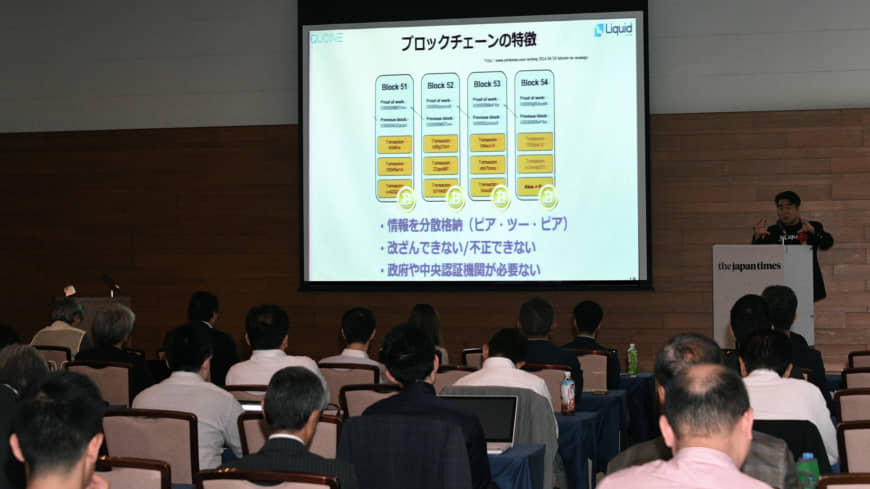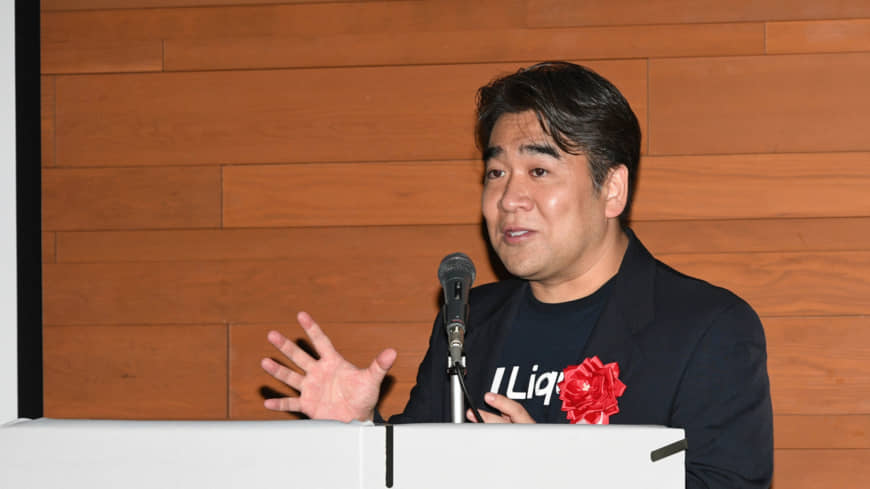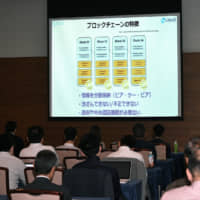Mike Kayamori, the co-founder and CEO of Liquid Group Inc., spoke about how blockchain technology is changing society and associated global trends at The Japan Times Advanced Technology Forum held in Tokyo on May 31. The forum was supported by the Ogasawara Foundation for the Promotion of Science and Engineering as one of its subsidized projects.
Liquid Group is a global financial technology company headquartered in Japan. Employee numbers have grown to more than 340 from 28 different countries in the five years since the company was established. Approximately half of its workers are engineers and developers.
As a cryptocurrency exchange and other next generation financial services provider and a token issuer, high levels of expertise and skills in blockchain technology and security are essential.
Blockchain infrastructure
According to Kayamori, blockchain is a “basic infrastructure” that supports industries including, but not limited to, cryptocurrency. It can be likened to a decentralized digital ledger where blocks of data are linked to each other as opposed to being in one vast database. It is highly difficult for falsified transactions to occur in one block because any incorrect information severs links with the neighboring blocks. “This is why blockchain technology has never suffered any major falsifications or setbacks since it was first generated,” said Kayamori.
This is also why blockchain technology is capable of supporting cryptocurrencies such as bitcoin. To date, Liquid Group has kept pace with the development of cryptocurrencies.
Bitcoin came into existence when the world was still suffering from the aftermath of the global financial crisis. The collapse of Lehman Brothers and Bear Stearns showed the hard reality that financial stalwarts could fail, causing global chaos.
“The underlying idea of bitcoin was to protect your financial assets by yourself,” said Kayamori.
Increased versatility
He became interested in this futuristic money that gave owners full ownership and control without relying on a central bank or a government. “Bitcoin can be used anywhere in the world. You can send it from one country to another across the world in real time for almost no charge. There had never been anything like that before,” said Kayamori.
In 2013, when Kayamori was working for SoftBank Group in Singapore, the value of one bitcoin was over $1,000. “The price hike was led by users in Asian countries such as China. This is when I became convinced that bitcoin was a real thing — a digital currency with the potential to replace gold as one of the key global currencies,” said Kayamori. “You cannot carry around gold bullion, buy something with it or transfer it, but you can do all of those things with bitcoin.”
When he was in charge of SoftBank’s operations in South and Southeast Asia, Kayamori learned that there were a significant number of adults in countries such as India or Indonesia who did not have bank accounts — most had smartphones instead. “There are thousands of small islands in Indonesia and the Philippines. Not all of them have bank branches or ATMs. However, the islanders have smartphones that can be used to make electronic payments and transfers,” said Kayamori.
“If you have a data plan and a mobile wallet, you can use cryptocurrencies. This is financial inclusion,” he said. “When I realized that the backbone of cryptocurrencies, blockchain technology, could be applied to other industries, I just had to get involved.”
That was why Kayamori started Liquid Group as an entrepreneurial project, before becoming officially independent in 2016.
“Mario Gomez Lozada, Liquid Group’s co-founder, president and CTO, agreed that we needed to create a cryptocurrency exchange so that cryptocurrency would go mainstream in the finance world,” said Kayamori. “Mario is an expert in financial services and has extensive experience in creating trading platforms and exchanges for corporate bond and commodity markets, as well as foreign exchange.”
The pair launched an exchange called Quoinex offering fiat-to-crypto trading in 2014, and made it their mission statement to make financial services accessible to all.
“Now there are hundreds and thousands of tokens, but at the time there was basically only one cryptocurrency — bitcoin. So our trading service needed to have fiat currencies and cryptocurrencies exchange functions,” said Kayamori. “We were granted an official license from the Japan Financial Services Agency in 2017, becoming the first global exchange to be licensed in Japan.”
Japan was the first country to regulate cryptocurrency exchanges. “It is not good to overregulate, but in this particular case concerning crypto assets and cryptocurrencies, regulations made it clear what is okay and what is not. This triggered the rapid growth of Japan’s cryptocurrency market,” said Kayamori.
Alternative financing method
What Liquid Group tried next was Initial Coin Offering (ICO), a funding method to raise money by issuing tokens. Their tokens, named Qash Token, raised more than ¥10 billion in only three days. “There were close to 5,000 token buyers from 98 countries, almost half of all the countries in the world. This is the democratization of financing,” said Kayamori.
“Before ICO was invented, if someone wanted to start their own businesses they needed to find angels or venture capitalist support, but now they can reach out to the wider world.” Kayamori suggested that ICO is revolutionary in the sense in that it has created a totally new ecosystem — one that consists of individuals who support a token issuer’s service, technology or vision by participating in the development of the project by purchasing tokens, and receiving rewards through the tokens. Using the experience of conducting ICO, they launched a platform for token issuers and participants in 2018.
“In the same year, we saw several incidents of hacking, theft, and fraud among cryptocurrency exchanges despite security always having been highly prioritized,” said Kayamori. He explained that security is the biggest issue in cryptocurrency trading because one could lose their entire assets if their private key was stolen.
Those incidences of hacking led to a plunge in cryptocurrency market user numbers that had reached feverish heights only a year before. A common criticism of cryptocurrency is that it lacks intrinsic value, but only one month after the bitcoin wallet and exchange service Coincheck suffered a massive hack, Kayamori and his team discovered interesting results from a customer survey that had been given to close to 4,000 people.
“What does cryptocurrency mean to you?” asked one of the survey questions. Top responses included “possibility,” “future,” “currency,” “technology” and “value.” “After reading this, I was reassured that cryptocurrency will continue to grow,” said Kayamori.
Cryptocurrency advantages
Technical improvements are constantly being made such as allowing offline management and increasing the number of quorum that validate transactions. Kayamori noted that there are more improvements to be made in capacity and processing speed among other factors, but there is no doubt that blockchain technology will continue to develop.
He pointed out that cryptocurrency has advantages over gold or fiat currencies in scarcity. “For example, bitcoin is at the upper limit on the total issuance which is 21 million bitcoins. About 18 million have already been mined,” said Kayamori. He explained that such limits were implemented from early on because of lessons learned from the “Lehman shock” where massive amounts of governmental money was lost, causing suffering among the general public.
“The value of things that are finite continues to increase in theory. Gold is not unlimited either, but no one knows exactly how much remains buried. There is an issue of purity too. On the other hand, anyone can get a clear grasp of the number of bitcoins in the market and where exactly they are,” said Kayamori.
“Many countries are printing new money in a bid to depreciate their own currencies so that they can become competitive in trade. But it means that the value of the money we have is inclined to go down.”
Cryptocurrency also offers high traceability because there are tools to track bitcoin, whereas it is impossible to trace where cash goes.
Volatility reduction
Because of such advantages and ongoing improvements, Kayamori believes that cryptocurrencies and tokens powered by blockchain technology will form part of a global network of all kinds of financial services. “The points and royalties you earn from shopping or using services will be replaced by tokens,” he said.
So-called stable coins are also emerging in the market. A kind of cryptocurrency with minimized volatility that can be pegged to fiat currencies, stable coins can help resolve the issue of the time lag caused by different business hours among financial services. “Cryptocurrency exchanges operate 24 hours a day, 365 days a year, but if you try to purchase cryptocurrency using fiat money, you are bound by the business hours of your bank. This is where stablecoins come in handy,” said Kayamori.
He stated that this trend is further expanding to include security tokens that encompass margin, option, or future trading, asset-backed securities, equity-based or fixed income-based securities and so forth.
The need for a flexible exchange at the global level will also increase as crypto products diversify. “Even in the midst of the current downward trend of cryptocurrency prices, our trading volume kept increasing since January 2018 until April this year,” said Kayamori.
Looking ahead
“I expect that in the future there will be companies that use blockchain to automate the process of issuing their shares or corporate bonds, or use blockchain technology in health care, factory automation and many other fields,” he said.
To make this happen, Kayamori thinks in addition to technically improving any systems, there will be challenges in overcoming people’s mind-sets. “Most organizations, including companies, governments and banks, have based decision-making and networking functions on a centralized system,” he said. Blockchain technology is the opposite. With decentralization being central to blockchain’s very essence, how and where to introduce the technology in existing services is key.
Kayamori explained that once these issues are cleared, the next question would be what kind of blockchain — public, private or hybrid — is suited toward each industry or service.
Energy concerns
In response to a question from the audience about the amount of electricity being used for blockchain, Kayamori said, “There are not many discussions about the cost of gold mining, refining, distribution and after-sales system but there is criticism against bitcoin for its use of electricity in mining.”
However, there are ways to get around this by using renewable or sustainable energies, or simply making an optimal choice of choosing the best location for the mining facility.
“For example, electricity companies have a mandate to replace part of their power generation capacity with renewable energy such as solar or wind power. They (can supply electricity to nearby households, but) do not have the power grid to send the electricity to central urban areas,” he said.
“In addition, it is too costly to improve the infrastructure for power transmission when it is clear that electricity demand will decrease in most parts of Japan as depopulation progresses,” said Kayamori. “So it makes sense to have a mining facility in a place where there is surplus renewable energy,” he said.
This page has been produced with the support of the Ogasawara Foundation for the Promotion of Science and Engineering, which was founded by late Toshiaki Ogasawara, the former chairman and publisher of The Japan Times. This page is also part of the series that highlight ESG (environmental, social and governance) activities of companies and other organizations.








